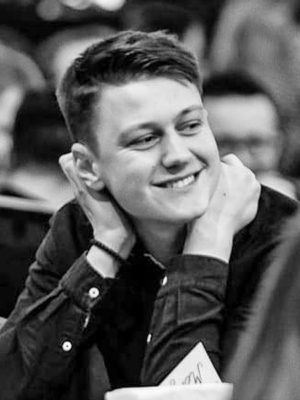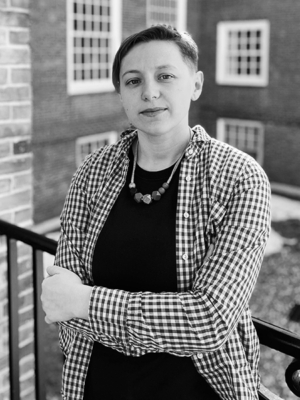The Mother
You shall now become a man of rock.
A solid and sturdy man,
slightly chipped.
As I always told you:
not a stone of stumbling,
not a cornerstone.
But a rock that river won’t cut through.
Now both of us know:
there are no vacations from war.
Only farewells.
May each of us
who added to your tears
also add firmness
to your body of rock.
It’s not a farewell but let me tell you this:
I’m always on your shoulder.
The world’s softest child—
from now on, you are a rock.
Amen.
Мама
Станеш тепер чоловіком із каменю.
Твердим і міцним, і трохи
надщербленим чоловіком.
Як я завжди казала:
не каменем спотикання
і не наріжним каменем.
Але таким, щоб вода не точила.
Тепер обидвоє знаємо:
не буває відпусток з війни,
тільки проводи.
Але кожен із нас,
хто добавив тобі сльози,
хай добавить і твердості
у твоє кам’яне тіло.
Це не прощання, але
я кажу, що завжди на плечі.
Найм‘якша Дитино У Світі,
віднині ти камінь.
Амінь.
Translator’s Statement
In times of war, poetry takes on a special significance. Its role expands, and what was yesterday a reflection on personal experience is today transformed into a documentation of violent reality, a fixation on the here and now with all its emotional whirlwinds, and an urgent attempt to make sense of what defies any rational explanation or interpretation.
The role of poets in wartime is also changing. Sometimes radically. After Russia launched a full-scale invasion of Ukraine last February, young Ukrainian poet Artur Dron traded his laptop and his workplace at the publisher’s office for a gun and a post in a front-line trench. But in his new role as a soldier in the Ukrainian armed forces, he never stopped being a poet. It’s just that his poetry has taken on a new sense of urgency, and now channels entirely new voices, experiences, and feelings—all of which bear an indelible, somber imprint of war.
In his poem “The Mother,” we hear the voice of a woman sending her son to war. This firm and resilient voice joins the chorus of mothers who, across history, countries and literatures, must do what no mother ever dreams of. The instruction she gives her beloved in the very first line—”You shall now become a man of rock”—sounds stern and rigorous, more reminiscent of a self-fulfilling prophecy than kind guidance. Kindness always lurks behind the lines and reappears in the final stanza, but it is strength, tenacity, and solidity—the qualities of rock and stone in English, камінь in Ukrainian—that come to the fore throughout the poem. The mother invokes the image of “a “rock that river won’t cut through” and asks her son to take it as his model in his new, unfamiliar life.
The final word in this piece, Amen, solidifies its form as a moral instruction, a mother’s command for turbulent times. In Ukrainian, this word—амінь—has almost the same spelling as камінь (stone or rock) at the end of the previous line, and would also rhyme with it if the stress in камінь fell on the second syllable. Unfortunately, this orthographic (and imperfectly acoustical) rhyme could not be retained, as sometimes happens in translation between languages that function completely differently. But I do hope that the English translation reproduces the lucid imagery and the strong yet kind voice of the narrator as they are found in the original.
ARTUR DRON is a writer from Lviv, a soldier of the Armed Forces of Ukraine, and a combatant in the Russian-Ukrainian war. In his early twenties, he is the author of a poetry collection “Гуртожиток №6” [Dormitory No.6]. His texts have been translated into Lithuanian, English, Polish, Italian, and Belarusian.
HANNA LELIV is a freelance translator from Lviv, Ukraine. She was a Fulbright fellow at the University of Iowa’s Literary Translation Workshop. Her translations of contemporary Ukrainian literature have appeared in Asymptote, BOMB, Washington Square Review, Circumference, and elsewhere. Currently, Hanna is a Leslie Center Faculty Fellow at Dartmouth College.






